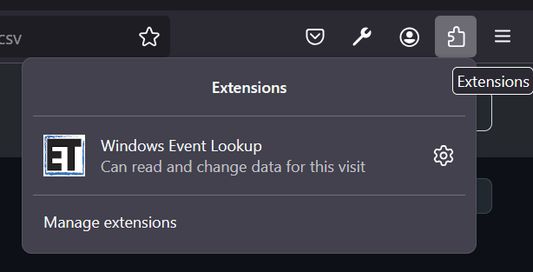Windows Security Event Log Lookup 作成者: ZtotheZ
The Windows Event Lookup extension enables users to search and retrieve detailed information on specific Windows Event IDs.
2 人のユーザー2 人のユーザー
拡張機能メタデータ
スクリーンショット



この拡張機能について
Quickly look up Windows Security Event IDs for detailed information. Simply select an Event ID, right-click, and choose "Lookup Event ID" to access relevant documentation and insights. This tool is ideal for system administrators and security analysts investigating Windows security events.
0 人のレビュー担当者が 0 と評価しました
権限とデータ
詳しい情報
- アドオンリンク
- バージョン
- 2.0
- サイズ
- 56.58 KB
- 最終更新日
- 19日前 (2026年1月29日)
- 関連カテゴリー
- ライセンス
- MIT License
- プライバシーポリシー
- このアドオンのプライバシーポリシーを読む
- バージョン履歴
- コレクションへ追加
To optimize browser performance and conserve resources, it’s recommended to keep these extensions disabled when they are not in use. You can easily enable any extension when you need to perform a lookup or access specific information, then disable it afterward. This approach helps reduce the extensions' impact on system memory and keeps your browser running smoothly.